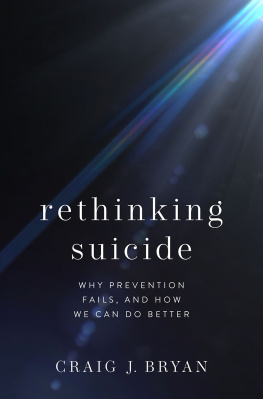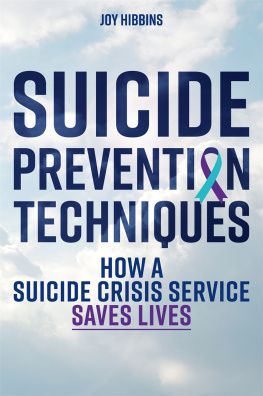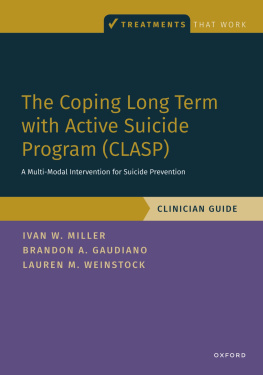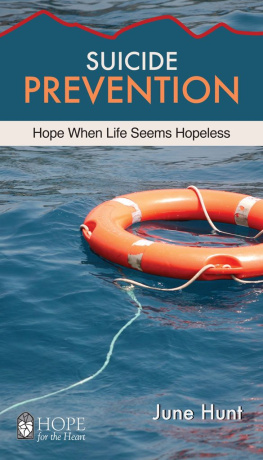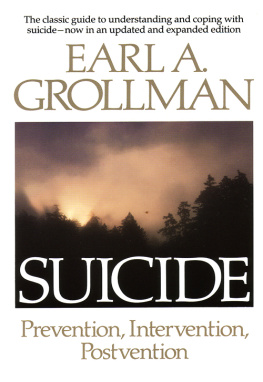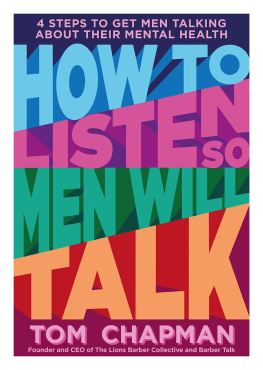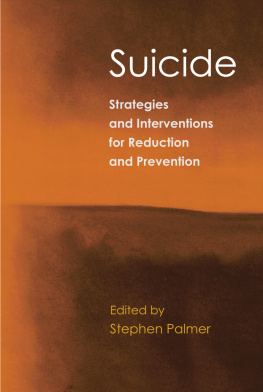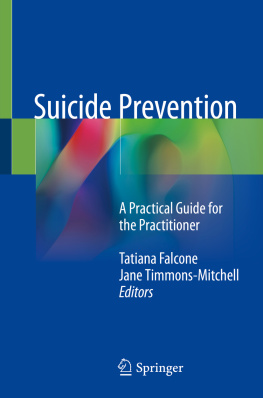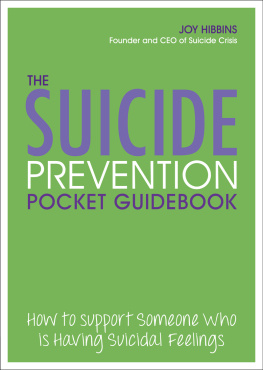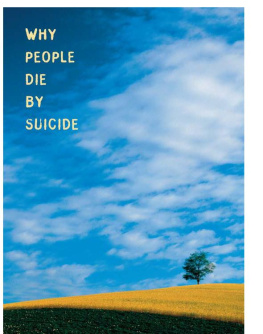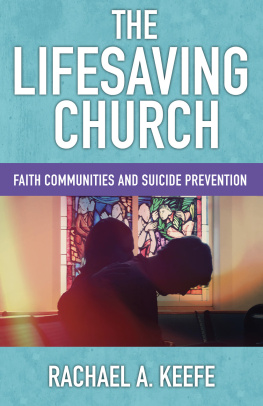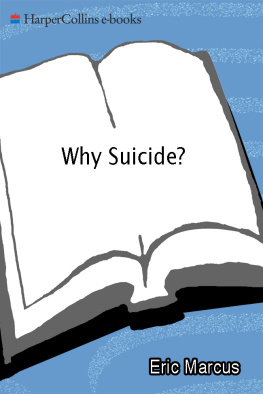Rethinking Suicide

Oxford University Press is a department of the University of Oxford. It furthers the Universitys objective of excellence in research, scholarship, and education by publishing worldwide. Oxford is a registered trade mark of Oxford University Press in the UK and certain other countries.
Published in the United States of America by Oxford University Press
198 Madison Avenue, New York, NY 10016, United States of America.
Oxford University Press 2022
All rights reserved. No part of this publication may be reproduced, stored in a retrieval system, or transmitted, in any form or by any means, without the prior permission in writing of Oxford University Press, or as expressly permitted by law, by license, or under terms agreed with the appropriate reproduction rights organization. Inquiries concerning reproduction outside the scope of the above should be sent to the Rights Department, Oxford University Press, at the address above.
You must not circulate this work in any other form and you must impose this same condition on any acquirer.
Library of Congress Cataloging-in-Publication Data
Names: Bryan, Craig J., author.
Title: Rethinking suicide : why prevention fails, and how we can do better/Craig J. Bryan.
Description: New York : Oxford University Press, 2022. |
Includes bibliographical references and index.
Identifiers: LCCN 2021005698 | ISBN 9780190050634 (hardback) |
ISBN 9780190050658 (epub) | ISBN 9780197577882
Subjects: LCSH: SoldiersSuicidal behavior. |
SuicidePsychological aspects. | WarPsychological aspects.
Classification: LCC HV6545.7 .B79 2021 | DDC 362.28088/355dc23
LC record available at https://lccn.loc.gov/2021005698
DOI: 10.1093/med-psych/9780190050634.001.0001
For Mom, Dad, Renee, and AnnaBelle
Contents
Im often asked which came first: researching suicide or joining the military. The question is hard to answer because, on the one hand, suicide has been of interest to me, at least to some degree, as far back as high school. On the other hand, it wasnt until I was deployed to Iraq in 2009where I stood over the bodies of service members who had died of self-inflicted gunshot woundsthat my commitment to researching and preventing suicide was cemented.
The U.S. invasion of Iraq, also known as Operation Iraqi Freedom, began on Thursday, March 20, 2003, during my second semester of graduate school. Because Thursdays were class days in our graduate program, all of the clinical graduate students were on campus that day. As first-year students, my classmates and I were enrolled in Interpersonal Psychotherapy that semester, which was taught back then by David Kopplin. At the start of class, Dr. Kopplin said he wanted to have a brief discussion about world events before getting into the planned topics for the day. I remember Dr. Kopplins concern that, as a nation, we were not talking with enough depth about the consequences of armed conflict, especially the psychological costs of war. A very small number of men and women, he feared, would bear the disproportionate weight of this cost. As clinical psychologists, he added, we would play an important role in helping these men and women to deal with these costs, potentially for the rest of their lives.
On the morning of March 23, 2003, I had no reason to suspect that I would ever join the military. To be honest, I dont think I was even aware that psychologists served in the military. Nonetheless, on March 28, 2005, almost two years to the day after that conversation in Dr. Kopplins class, I raised my right hand in an Air Force recruiting station in Dallas, Texas, and took the Oath of Commissioned Officers, becoming a military officer and Air Force psychologist. Joining the military was, admittedly, a direction that few peopleincluding myselfwould have ever predicted for me; I certainly wasnt the military type. For many years, when friends and family would ask me why I chose to pursue this unexpected path, I couldnt really explain it very well; I just felt like I had to do it. Today, nearly a decade and a half later and with the benefit of hindsight, I think the idea of joining the military was first planted by Dr. Kopplin on March 23, 2003, when he delayed the start of our class to talk about the consequences of war. That seed was subsequently watered and nourished by David Rudd, who was the Director of Clinical Training when I was a graduate student and would become a key mentor over the course of my career. David had served as an Army psychologist during the first Persian Gulf War, and encouraged me over the course of my graduate training to consider military service as a professional path. Its meaningful work, David repeatedly told me during my years as a student; theres nothing else like it.
I served on active duty as a psychologist for just over four yearsfrom 2005 to 2009at Lackland Air Force Base in San Antonio, Texas, although the final six months of my active duty service were spent at Joint Base Balad, Iraq. In this role, I conducted neurocognitive assessments and provided treatment for U.S. military personnel and coalition forces who had sustained head injuries. On top of these responsibilities, my duties included providing consultation to the medical and surgical staff working in the hospital and providing psychological treatment to the 20,000-plus military personnel stationed on the base. Although my job in Iraq was similar in many respects to my job in the United Statesconducting diagnostic assessments, providing psychological treatment, consulting with commandersthe context of Iraq was very different, to say the least. In the United States, for instance, when I talked with service members about deployment-related trauma, we were typically talking about events that had happened years before. In Iraq, however, when I talked with service members about these same topics and issues, we often were talking about events that had happened only a few days, or even mere hours, before.
In Iraq, I came face to face with trauma and the brutality of suicide in a way I had not experienced before. Among deployed military personnel, suicides are almost exclusively the result of self-inflicted gunshot wound, owing to the fact that deployed military personnel have very easy access to loaded firearms pretty much all the time. When I was in Iraq, deceased service members would sometimes be received by our hospital and held temporarily, hooked up to various life support devices to preserve organ functioning while awaiting transport back to the United States. Once home, those who had volunteered as organ donors were taken to the operating room for transplant surgery. We followed these procedures for all deceased service members, regardless of the manner of death, including suicide decedents. Suicide decedents tended to have a different effect on us, though. When a suicide decedent was in the hospital, the mood and climate seemed to shift. It wasnt a dramatic change, but it was noticeable; something you felt more than observed. I remember one day during lunch with a small group of hospital staff, someone asked if the deceased service member who had arrived earlier that day was a suicide. No one in the group was sure, but someone asked why she wanted to know. No reason, she answered. It just feels like suicide. After lunch, we learned that she was right: The deceased service member who had arrived that morning had died by suicide.

